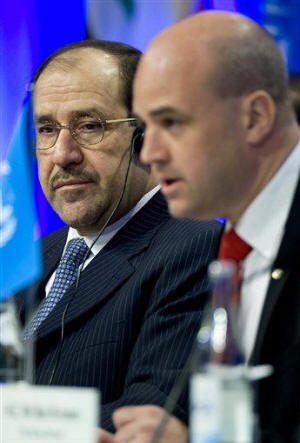|
 Iraq prime minister calls for debt relief at UN conference Iraq prime minister calls for debt relief at UN conference
 Send a link to a friend
Send a link to a friend
[May 29, 2008]
UPPLANDS VASBY, Sweden (AP) -- Iraq's prime minister called Thursday for neighboring countries to forgive debts and war reparations, saying they are hindering the nation's recovery despite a reduction in violence.
Opening a U.N. conference on Iraq, Prime Minister Nouri al-Maliki also praised his country's security and economic progress. He said his government had kept Iraq from descending into the "abyss of civil war."
"Iraq has achieved major success in the battle against terrorism with the support of the international community," al-Maliki told the conference through a translator.
Iraq has at least $67 billion in foreign debt -- most of it owed to fellow Arab countries Saudi Arabia, Kuwait, the United Arab Emirates and Qatar.
|
|

Al-Maliki said Iraq needs to get rid of the burden of war reparations from Saddam Hussein's regime and debt which he called "an impediment against reconstruction and development."
More than 500 delegates from dozens of countries and international organizations attended the conference outside Stockholm, including Secretary of State Condoleezza Rice, U.N. Secretary-General Ban Ki-moon and Iranian Foreign Minister Manouchehr Mottaki
"The Iraqis don't need large sums of money," Rice told reporters before the conference. "They do need large infusions of technical assistance (and) project support."

"I would hope that the international community would accelerate its efforts to help make Iraq a capable state," she said.
Later, she urged Arab neighbors to support Iraq through official visits and by opening embassies in Baghdad.
Kuwait last month said it was looking to buy a building for an embassy in Baghdad's U.S.-guarded Green Zone. It would be the first Kuwaiti Embassy in Iraq since Saddam invaded his tiny oil-rich neighbor in 1990.

Ban said there was new hope for the Iraqi people "to rebuild their country after years of war, dictatorship and neglect" and called for reconciliation among the country's Sunni Arabs, Shiites and Kurds.
"I urge Iraqi communities to work together in a spirit of national unity to resolve fundamental issues that continue to divide them," Ban told the conference. "These include the federal structure of Iraq and the sharing of the country's wealth and natural resources."
[to top of second column]
 |
 Iraq's Sunni minority has long felt it is being sidelined by the majority Shiites and the Kurds, who dominate the Iraqi parliament and al-Maliki's government.
The largest Sunni political bloc pulled its members out of Iraq's 39-member Cabinet in August, saying it was not getting enough say in decision-making. Sunni politicians have been negotiating a possible return but said Wednesday they suspended talks due to a dispute over ministry posts.
The conference is the first annual review of the International Compact with Iraq, a sweeping five-year economic and political reform package that Ban helped broker last May in Egypt.
The compact defined international help for Iraq -- including debt relief
-- but also set tough commitments for the Baghdad government, particularly carrying out reforms aimed at giving Sunni Arabs a greater role in the political process.
Several demonstrations were planned in Stockholm and outside the conference center in Upplands Vasby, about 15 miles north of the capital. Officers from seven counties, the SAPO security police and a national anti-terror unit will be deployed during the conference.
[Associated
Press; By KARL RITTER]
Associated Press writer Matthew Lee contributed to this report.
Copyright 2008 The Associated
Press. All rights reserved. This material may not be published,
broadcast, rewritten or redistributed.
 |